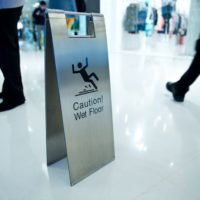Slip and Fall Settlement Amounts in California

A slip and fall is more technically called premises liability and is only part of this facet of personal injury law. Owners of private and commercial property, as well as owners of public property, have a duty or care to persons who are invited on the property or who come there to for a legitimate or legal purpose.
Slip and fall cases are among the most difficult personal injury cases to settle and for a reasonable amount because of issues of liability, comparative liability and other factors that may not be so apparent. Consequently, you should retain an experienced personal injury attorney who has successfully negotiated or tried slip and fall cases.
Liability as a Factor in Settlement
A slip and fall can occur on a stairway, step, parking lot, construction site or any area owned and maintained by the property owner. Owners of commercial property such as retail or grocery stores have a duty to inspect their property for defects and safety hazards and to remedy them or adequately warn consumers or invitees of the danger. Regarding hazards the owner must have had actual or constructive notice of the condition such as a slippery surface or liability may not be imposed. They can also claim that they may not be held at fault since the hazard could have been reasonably discovered by anyone using ordinary care.
Private owners have a lesser duty of care to persons on their property while the liability of government entities is generally subject to legislation. In any case, the value or amount of a slip and fall settlement in California can be diminished if liability is uncertain or if there is comparative fault on the part of the injured victim. Many injuries are sprains or strains and even if the injury is significant, the property owner or insurer often assert that any defect or hazard that allegedly caused the injury was open and obvious and that the injured victim failed to use exercise ordinary care and contributed to the injury.
Nature and Extent of the Injury
If liability can be proved, then the plaintiff must demonstrate the severity of the injury, or its nature and extent. For instance, was the injury merely a sprained ankle or did it result in an ACL tear requiring surgery; or did the concussion escalate into a traumatic brain injury and a cognitive disability?
The extent of the injury refers to its severity but also the impact on the plaintiff’s daily living activities and life in general, or the person’s quality of life. For instance, an individual who was an avid tennis player who breaks his wrist and is unable to compete any longer is more likely to recover more in compensation than someone who is lives a mostly sedentary life.
An injury, however, that disrupts or diminishes the plaintiff’s ability to engage in routine, daily living activities can also recover substantial compensation. Injured claimants who can no longer drive, walk more than a block or lift their small children can claim a significant impact on their quality of life as well.
Other Factors in Valuing a Claim
Besides liability and the severity of the injury, other factors that can determine the value of a slip and fall settlement include the character of the plaintiff, the venue or where the lawsuit is filed and the attorney handling the case.
A plaintiff with a history of drugs or criminal behavior, or who has a spotty employment record, is less likely to be viewed favorably by a jury than the hard-working parent of three children and may be suspected of malingering or exaggerating injuries in hopes of a big pay day.
Cases that are filed in particular counties in California may also influence a claim’s value with some more conservative than others in compensating injured plaintiffs. Generally, urban juries are more likely to award more than those in rural areas. Juries in the latter case may identify more with a small business owner in their town who is largely faceless in a metropolitan area like Los Angeles or San Francisco.
Insurers may also consider the plaintiff’s attorney. A lawyer with no trial experience or who always settles before trial may be less likely to receive a settlement that a seasoned trial lawyer might obtain. Also, the more experienced attorney will more typically present a settlement package or demand that covers all the disputed issues and can persuade the insurer to make an offer that is more likely to be acceptable to the plaintiff. Contact the experienced attorneys at Ritholz Law if you have any questions about slip and fall accidents or this article.
